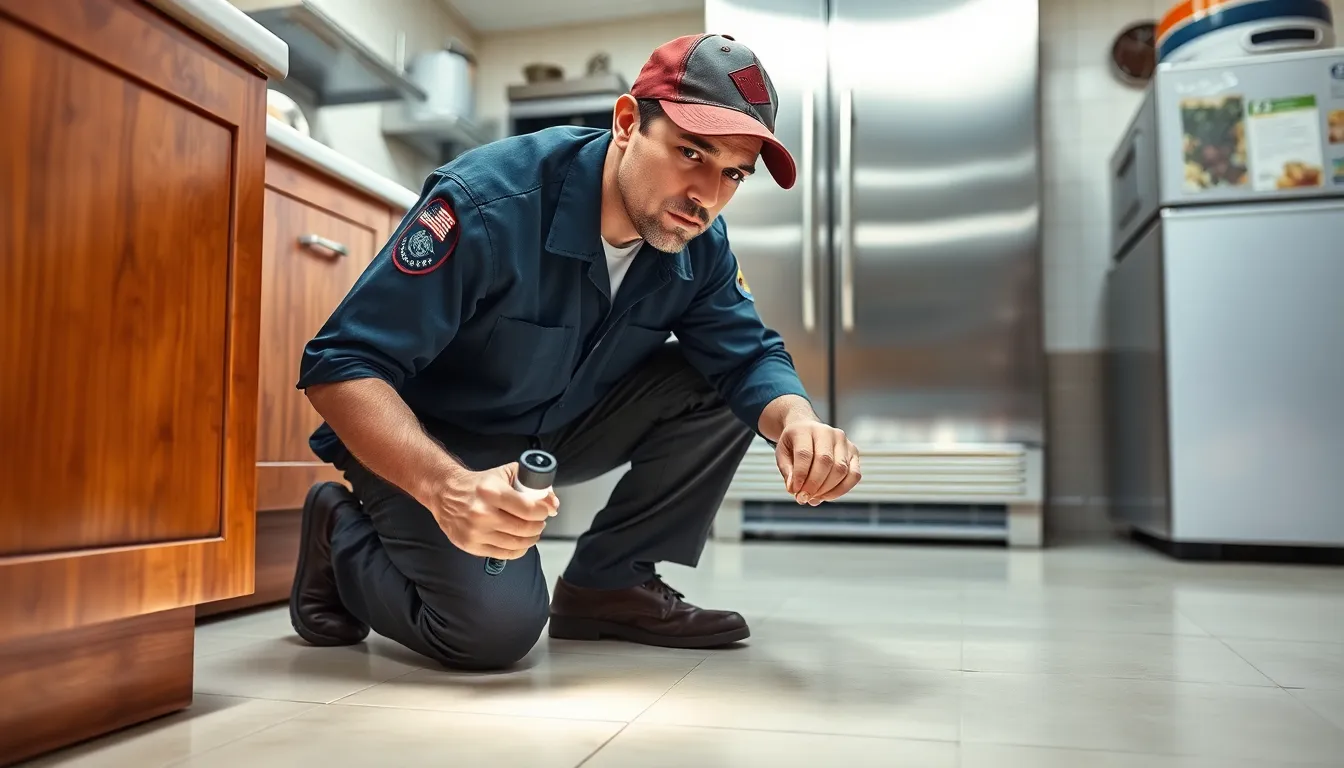In the bustling world of business, the last thing anyone wants is an uninvited guest—especially if it has six legs and a penchant for munching on inventory. Commercial pest control isn’t just a luxury; it’s a necessity. A single rogue rodent or a swarm of ants can wreak havoc on a company’s reputation, not to mention its bottom line.
Imagine welcoming clients only to have them discover a surprise insect show in the break room. Not exactly the first impression anyone hopes to make! With effective pest control strategies, businesses can keep their spaces pest-free and their reputations intact. It’s time to take a stand against pests and ensure that the only thing buzzing in the office is the sound of productivity.
Table of Contents
ToggleOverview of Commercial Pest Control
Commercial pest control plays a crucial role in maintaining a healthy business environment. Effective strategies protect a company’s reputation and financial integrity from potential pest infestations.
Importance of Pest Control in Businesses
Pest control significantly influences client perceptions and overall workplace productivity. Businesses losing customers due to pest infestations face detrimental effects on revenue. Staff morale often declines in environments infested by pests. Moreover, maintaining a pest-free space ensures compliance with health regulations. Preventing pest-related issues strengthens a company’s brand image. Investing in pest control services yields long-term benefits by reducing the risk of infestations.
Common Pests in Commercial Settings
Common pests frequently found in commercial settings include rodents, ants, and cockroaches. Rodents often damage property and transmit diseases, making them a top concern. Ants invade in search of food, often appearing in large numbers. Cockroaches can contaminate surfaces and trigger allergies. Other pests like termites compromise structural integrity and lead to costly repairs. Fly infestations can also disrupt operations, especially in food establishments. Identifying these pests promptly allows for effective intervention, safeguarding business interests.
Methods of Commercial Pest Control

Commercial pest control employs various methods to effectively manage and prevent infestations. These methods play a crucial role in safeguarding businesses from potential damages.
Chemical Control Methods
Chemical control methods utilize pesticides to eliminate pests. Various formulations exist, including sprays, baits, and gels, each targeting specific pest types. In commercial environments, professionals often apply these chemicals in a strategic manner to minimize disruption to daily operations. Safety regulations mandate that licensed technicians handle these substances, ensuring compliance with local laws. Effectiveness hinges on choosing the correct pesticide and applying it according to label instructions. Fast-acting options provide immediate results, while longer-lasting formulations protect against future issues.
Non-Chemical Control Methods
Non-chemical control methods focus on prevention and maintenance. Strategies include sanitation practices, such as deep cleaning and proper waste disposal, which reduce food sources for pests. Physical barriers, like installing seals on doors and windows, deter rodent entry and insect infestations. Integrated Pest Management emphasizes monitoring pest activity and combining various techniques for optimal results. Natural repellents, including essential oils, can also be effective in some scenarios. Regular inspections help identify potential vulnerabilities, allowing for proactive measures to keep pests at bay.
Choosing a Pest Control Service
Selecting a pest control service requires careful consideration of several key factors. Businesses should prioritize providers who demonstrate expertise in commercial pest management.
What to Look For in a Provider
Experience in the field significantly impacts pest control effectiveness. Seek companies with a proven track record and positive customer testimonials. Licensed and certified professionals ensure compliance with industry regulations. Evaluate their range of services; a versatile provider offers tailored solutions for various pest issues. Strong communication skills enhance service delivery. Look for companies that prioritize transparency and provide clear explanations of their methods.
Questions to Ask Before Hiring
Inquiring about a provider’s approach is crucial. Ask about their pest control methods: are they chemical, non-chemical, or both? Understanding their inspection process and response times is essential for timely interventions. Discuss safety protocols for employees and clients. Inquire about warranties or guarantees; these reflect a commitment to service quality. Consider asking for a detailed estimate to compare costs and services. This information helps businesses make informed decisions when choosing a pest control partner.
Preventive Measures for Businesses
Businesses must implement preventive measures to effectively manage pest control. Various strategies help in minimizing risks and creating a pest-free environment.
Regular Inspections and Maintenance
Regular inspections and maintenance play vital roles in pest prevention. Schedule inspections at least quarterly to assess potential vulnerabilities. During these inspections, professionals can identify signs of infestations early, reducing the chances of larger problems developing. Maintenance tasks such as sealing cracks or gaps can significantly deter pests from entering spaces. Establishing a routine check allows businesses to stay proactive rather than reactive. Documentation of inspection findings helps in tracking pest activity over time.
Employee Training and Awareness
Employee training and awareness programs enhance a pest-resistant culture within the company. Training sessions should educate staff on identifying common pests, their signs, and preventive practices. Awareness initiatives empower employees to report any unusual activity promptly. Providing resources such as guides or safety protocols encourages ongoing vigilance. Regular refresher courses strengthen knowledge and retention among staff. A well-informed team can contribute significantly to maintaining a pest-free environment, ensuring that everyone remains responsible for fostering a safe workplace.
Effective commercial pest control is essential for maintaining a healthy and productive business environment. By prioritizing pest management, companies can protect their reputation and ensure compliance with health regulations. Implementing a combination of chemical and non-chemical strategies allows businesses to address infestations while minimizing disruptions.
Regular inspections and employee training play critical roles in fostering a pest-resistant culture. Choosing the right pest control partner with proven expertise can further enhance a company’s efforts. With a proactive approach to pest management, businesses can focus on growth and success, free from the distractions that pests can cause.





